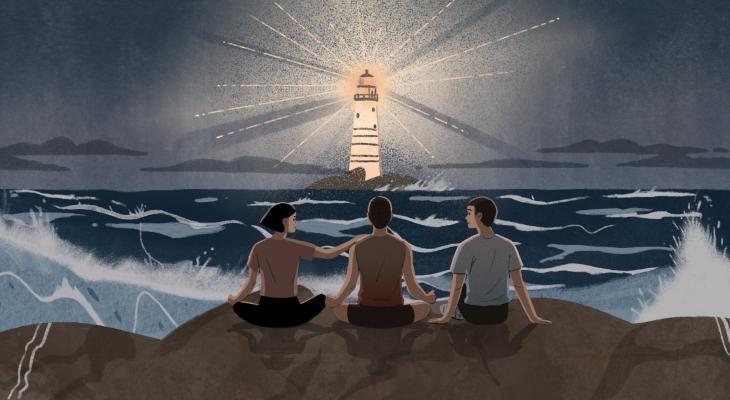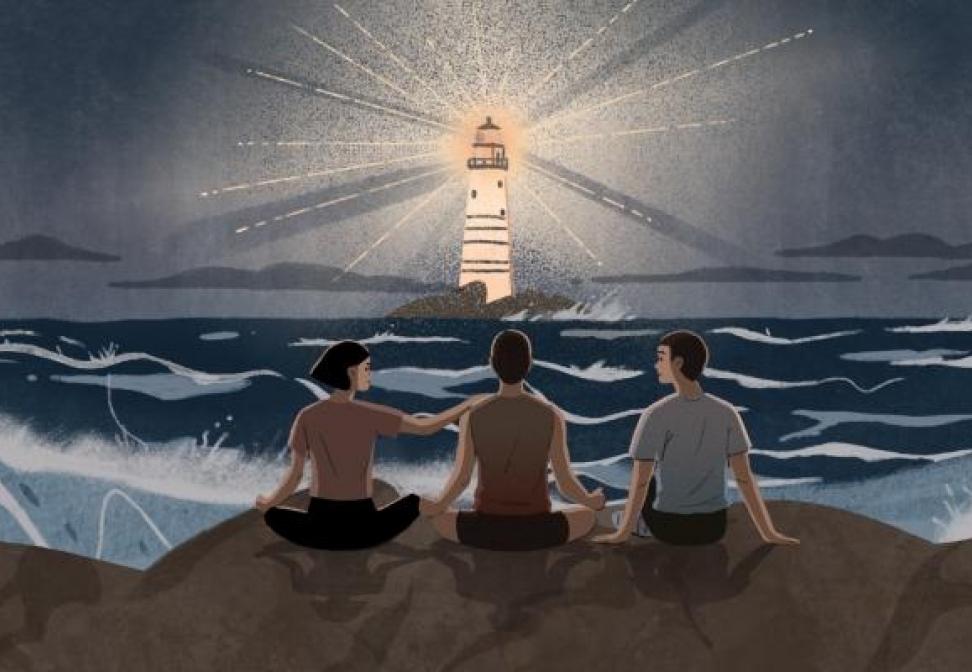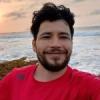A Refugee Finds a Lighthouse in the Storm
The smugglers were shouting, “Quiet, quiet, police, police”.
We were in the jungle. It was dark. Women were shaking, trying to keep their children calm, putting their hands over their children’s mouths. An old lady was crying, praying in a whisper, holding my right hand and I was holding Sara’s hand with my left hand. She was shocked and frightened. I was pretending that I was not scared and that nothing was going to hurt us. We were heading to the shore. I could see the light of the lighthouse, a dot on the sky and reflected on the sea.
The smugglers continued: “Go, go, go to the water.” The guy was in the boat near the shore, about 200m away. I balanced my bags on my head, holding Sara’s hand. Women and men put their children on their shoulders. Water was reaching our throats. I felt like we were at the end of a rope. More than 20 people in a small boat. Men were helping women to get on the boat. Children were crying and the smugglers kept saying, “quiet, quiet, police, police.”
That was in 2014. Seven years on, I still feel like I am in the boat and the weather is dark and stormy. Where is the destination? I do not know. When did the boat touch the sand of shore? I do not know. Can I save the boat from crashing with the rocks? I can’t. Can I live in the boat till the end of my life? I can’t!
As Indonesia is not one of the countries which ratified the Refugee Convention of 1951, refugees are not allowed to work. They do not have access to education. Most refugees are held in camps and detention centers. Changes in Australia and the US have affected the resettlement opportunities of refugees in Indonesia. In the last seven years, Australia reduced its intake of refugees and decided not to resettle refugees who have come to Indonesia after July 2014. In America, Trump banned Muslims from seven countries and reduced the refugee intakes from all over the world. And now we have COVID-19 on the ground, which has made conditions even worse. It made refugees more isolated than before.
Most refugees have lost their family's financial support from abroad. Parents are more worried about their children’s physical and mental health. There is no health insurance or health services for refugees in Indonesia. During this time, some online classes are held by refugee learning centres but many of the refugees’ children do not have access to laptops or phones to participate. The process of refugee resettlement was very slow before COVID-19 and now it has almost stopped. The refugee communities lose hope and motivation for a normal life, that is why they started protesting and raising their voices to be heard and seen by the people responsible. These days, refugees sleep on the streets in front of the UNHCR building for sometimes up till a year to get shelter, to go live in the detention centres. Recently five young boys committed suicide because of this devastating situation.
Amid all this, the friendships that I have made in this voyage have been like lighthouses in the storm.
When I arrived in Indonesia, I started learning English and Bahasa Indonesia through books, social media and Youtube channels. I was interested to learn as much as I could. There were a few opportunities in terms of education for refugees. To get better, I decided to work voluntarily in refugee-led initiatives, so I could help myself by serving others.
My job as a volunteer started in a refugee learning centre. Before COVID-19, we had visitors from abroad as well as local people. Now, since they are unable to visit because of COVID-19, they continue to support financially from afar. They also volunteer remotely as teachers for our limited online classes. Some of them are lecturers and some of them are university students. They provide teacher training and workshops about mental health. We also have some Indonesian friends who are social workers. They help us to handle some of our daily problems in our community.
We have a yoga teacher, her name is Natascha Flowers. She is from Australia. We have online yoga sessions every week. We have learnt a lot from her. She has taught us to know ourselves better mentally and physically and how to deal and cope with the difficulties in our lives. When I close my eyes in the breathing exercise, I feel energetic and positive. I think of beautiful things in my life: my family, my friends who always make me feel I am not alone and isolated. I have their support. It gives me the potential to be calm in stormy weather.
Alberto Glemi assists us in a very different way. He is from Italy. He started a reading club and encouraged us to participate. I got interested in reading after knowing and talking with him. The books he introduces us to make me think and listen to new and different ideas. Reading stories can change your way of life. The hardships that the people go through in the stories make me feel thankful about my life.
Nowadays, I am a member of The Archipelago writers collective. When I met Kieren, he was a university student. He came to us with this question, do you want to be a writer? Before knowing him, I was not aware of my ability as a writer. He taught me how to express my thoughts and how to share it with others. I realised the power of writing. The Archipelago can be our voice in the world.
As a teacher, and with the help of my friends, I am able to build strong relationships with my students, especially with the naughty ones! I have learnt from them how to teach better, how to learn from my students, how to be a good listener in my classes, how to communicate and how to make a funny and joyful environment for myself and the people around me. I encourage my students to write their daily events in a diary. Creativity, friendship and reading are the things that I try to prioritise and I follow them in my life and my classes.
These people have been like a shelter and lighthouse in the storm. When I feel I am lost at sea, they show me the way. They help me to not be afraid of the big waves. I am better and stronger than ever. I am determined to cross this super challenging way to get to the safe shore!
(Illustration: Ng Yin Shian)
Sade Del is a member of the archipelago, a writers collective that builds community and mentorship with refugee and migrant background writers. The collective was founded to train new writers who are refugees in Indonesia towards professional publication and forge relationships between writers across islands. This piece was written as part of the partnership between Our Better World and the archipelago.






